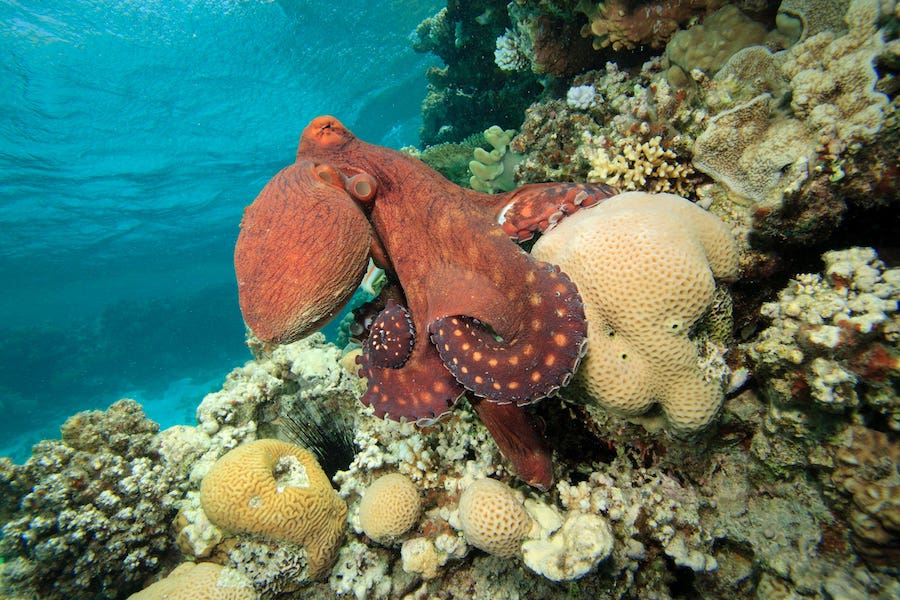World Octopus Day: 8 reasons the octopus is nature’s greatest miracle
Everyone’s a sucker for an octopus!
It’s World Octopus Day, so the perfect time to celebrate the eight-tentacled cephalopods that rank among Earth’s most fascinating creatures.
Darlings of modern science, their myriad of talents range from glittering intelligence to regenerating tentacles at will. Here’s why octopuses are one of nature’s greatest miracles, and the most interesting animals in any lab…
1. Octopuses probably have the world’s best camouflage

Masters of disguise that can blend seamlessly into the seafloor, octopuses make the average chameleon look like a bear trying to hide behind a lamp post. Not only can octopuses change colour, they physically texturise their skin to imitate almost any surface, and contort themselves into whatever shape will hide them best.
The mimic octopus takes this talent one step further, aping not just landscapes but other animals. By twisting its tentacles into scales, fins, and flippers, this cunning critter is known to impersonate crabs, jellyfish, and even sea snakes.
2. We have no idea what the correct plural is

Written variously as octopi, octopuses, and octopodes, lexicographers have argued for centuries over the correct way to describe more than one octopus. Merriam-Webster notes that the word comes from “Greek with a stay in New Latin”, and that the three endings each have a different linguistic base.
Octopi favours a Latin suffix, octopodes takes it’s ending from Greek, while octopuses (sometimes written octopusses) is an anglicisation dating from the late 19th century. So they’re all right. Maybe. Depending on who you ask.
3. They’re expert escape artists
Clever, observant, and downright sneaky, these non-human Houdinis have gained a measure of fame on YouTube for their extraordinary ability to escape confinement. They can squeeze through minuscule spaces, learn to open doors by pressing buttons, and even make short land crossings if need be.
4. Octopuses have mastered tool use
If you’ve watched 2001: A Space Odyssey, you’ll know that tool use is a pretty big deal for species development. Humans have mastered it – most of them, anyway – chimpanzees have mastered it, as have dolphins, sea otters, and a couple of birds.

Wild octopuses have taken to protecting themselves with clam shells, and forging shields out of coconut husks, but with practise, captive creatures have done much more. In 2014, an octopus in an aquarium in New Zealand set a new record by opening a childproof medicine bottle in under a minute.
5. Sex is fatal for octopuses
For octopuses, romance and murder are pretty much the same thing. Males usually last at least a month or two after mating, but for mummy octopuses, a much worse fate is in store. She will obsessively guard her eggs, starving herself in the process, before committing “cellular suicide” when they hatch, organs and tissue physically disassembling until she dies.
In 1977, scientists traced this behaviour to a particular gland between the octopus’s eyes, similar to the pituitary gland in humans. When this gland was removed, female octopuses would immediately abandon their eggs, and live long and apparently happy lives.

6. Octopuses have three hearts, and blue blood
One heart pumps blood through its major organs, and the other two take care of the gills. The organ heart stops beating while the octopus swims, perhaps why most octopuses avoid swimming in favour of scuttling across the sea-floor like a sub-aquatic spider.
Octopus blood is blue because it contains a copper-based protein named hemocyanin, which carries oxygen, much like human equivalent hemoglobin.

7. Octopuses are really, really, really old
The oldest known octopus fossil belongs to a species named pohlsepia, and dates back 296 million years – before most of the dinosaurs had even dragged themselves out of the oceans. The fossil resembles a frisbee-shaped splodge, though closer examination can just about distinguish the tell-tale tentacles and ink sack. Today it’s on display at the Field Museum in Chicago.
8. Some of them are actually a little bit cute

We know, they have eight legs and are slimy, but there’s at least a few species of cephalopod out there that could induce a faint ‘aw’. Consider the dumbo octopus, a small grey specimen named for its resemblence to Disney’s big-eared elephant, or the tiny orange octopus so sweet scientists almost named it opisthoteuthis adorabilis.
The Press Association
Latest posts by The Press Association (see all)
- King to resume public duties after positive cancer treatment - April 26, 2024
- 3 recipes to make from the new Hairy Bikers cookbook - April 26, 2024
- World Penguin Day: Test your knowledge with our penguin-themed quiz - April 23, 2024
- Kate’s new photo of Louis released to celebrate prince’s sixth birthday - April 23, 2024
- Alan Titchmarsh: Slugs are never going to be my friends - April 23, 2024






















